| Many modern readers who love Jane Austen are eager to find ways to acquit her of being a woman of the long 18th century. Clutching My Pearls is my ongoing blog series about my take on Jane Austen’s beliefs and ideas, as based on her novels. Click here for the first in the series. |
 That "plantation" didn't have a sinister meaning in Austen's time?
That "plantation" didn't have a sinister meaning in Austen's time? there's an 1809 novel that contains 14 uses of the word “slave” and one use of the word “plantation” and features a wise and benevolent character named Mrs. Mansfield ?
Well, if you aren't hip-deep in Mansfield Park commentary, I suppose you would say, “so?” But if you are au fait with modern scholarly analysis, you would know that Jane Austen’s Mansfield Park (1814) is generally thought to be named after Lord Mansfield, whose 1781 ruling in the Somerset case effectually ended slavery in the United Kingdom. And you’d be aware that although there is only one reference to the slave trade, in which no opinion is expressed, many scholars think Mansfield Park has a pro-abolition theme.
So what if I told you that Celia in Search of a Husband, despite using the word “slave” 14 times, and despite having a character named Mansfield, is absolutely not about slavery at all? Even though debates raged over slavery at this time, it was common to speak of ladies making "slaves" out of their admirers, or being a "slave to fashion." (Austen has "Miss Crawford was not the slave of opportunity" in Mansfield Park.)
Celia in Search of a Husband has other fish to fry instead of British imperialism; it was written to take advantage of the popularity of Hannah More’s moralizing best-seller Coelebs in Search of a Wife which came out at the end of 1808. The success of More’s novel about a single man looking for a good wife led to many sequels (written by others, not More) and imitations. And yet, Celia in Search of a Husband is not really about a search for a husband, although a husband shows up near the end. It’s about the heroine, Celia Delacour, travelling to the wicked city, observing its vices and follies, and explaining her Christian principles to anyone who will listen and lots of people who won't...
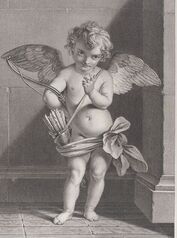
One thing I’m noticing about these sentimental heroines of the past is that it makes a huge difference if they are heiresses. Heroines with money are more likely to have agency and to stand up for themselves. Nobody can bully Celia in the way Fanny Price is bullied by Mrs. Norris in Mansfield Park. Fanny begs her cousins to “please excuse” her from participating in their theatricals. When Celia is invited to play Juliet to a young swain’s Romeo, she responds, “No inducement could tempt me to an exhibition of the sort.” Fanny watches but says nothing to Lady Bertram when Henry Crawford behaves seductively toward both Maria and Julia. Celia openly declares: “It is certainly beneath the character of a delicate woman to admit a known seducer into her parties.” Fanny Price is judging you, but she keeps her thoughts to herself. Celia lets you know what she thinks.
But, when Celia explains that she needs an escort so she can leave the party by midnight, or that Lord so-and-so is a trifler, her little speeches are always punctuated by a smile. Several dozen times we read “said Celia, smiling” or “said our heroine, smiling.”
“What do you wear at [Lady] Cardonnel’s tomorrow?” her sister Fanny asks her.
“I shall find a dress that shall do,” said Celia, smiling.
“But… remember, my love, that the costume of an evening party is very distinct from a morning dress—in fact, you must undress to go into public.”
“I am not practically informed on this essential point,” said Celia, smiling, "but I have made some observations on a few whom I have seen—Lady Cardonnel, and Lady Blindon… but worlds should not tempt me to adopt the style of either…”
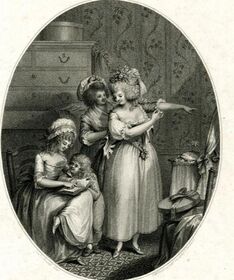 Celia befriends her sister's child while she is busy with her toilette
Celia befriends her sister's child while she is busy with her toilette Celia is set in London and as usual, fashionable life in town is portrayed as being (a) horrible and (b) irresistibly tempting. Celia’s older sister Fanny, for example, has been corrupted by high life. She neglects her children and is eager to put off mourning and resume the social whirl after her little boy dies. Celia is never tempted by the vortex of dissipation, no, not for an instant.
As for style, Celia in Search of a Husband is very heavy on italicized emphasis. All of the characters speak in this emphatic fashion, and so does the narrator when she is directly addressing the reader, which is often. This gets pretty tiresome.
And yet, Celia the knock-off is somewhat more entertaining than the original Coelebs in terms of plot, because there actually is a central plot. Things actually happen in Celia. A sweet innocent girl is seduced, and Celia is briefly misled about who seduced her. The author contrasts Celia's staunch resistance of London wickedness with a sub-plot about her servant Patty, who falls for the wiles of a bigamist who steals all her savings.
In Coelebs, there is no impediment whatsoever keeping the hero and heroine apart. He stays at her father’s house, gets to know her, falls in love, proposes, and is accepted. In Celia, at least the author keeps us guessing as to who the heroine will marry, and she makes an effort to put impediments in the way.
Both Coelebs and Celia have a number of sub-plots involving minor characters--or rather, we have moralizing characters and thoughtless characters exchanging their opinions on the topics of the day, and we have gossip about the doings of various people. Both novels have a central figure whose chief function is to comment on the moral shortcomings of everyone around him and the faults of society in general. In Coelebs, that’s Dr. Stanley, Lucilla’s father. In Celia, it’s a friend of the Townly family, an older bachelor named Belford.
In a modern age, the moralizing Mr. Belford would have a job. He would therefore have better things to do than call on his neighbours and friends every day and tut-tut over their faults, a habit that you think would make him distinctly unwelcome, like King Gama in Princess Ida. But Mr. Belford is a gentleman and doesn’t have a job, and like all the other characters we meet (except for servants, of course), his days consist of paying visits and his evenings consists of dinners and other social engagements. He shows up everywhere Celia goes, anxious for her survival in the wicked city, and soon falls in love with her.
In addition to the things we've already mentioned, both Celia and Mr. Belford disapprove of:
- people who don't donate generously to charity.
- dresses without pockets--yes! (I think "pockets" meant a drawstring pouch hidden or attached to your clothes.)
Celia carries money so she can give alms to the poor.
|
|
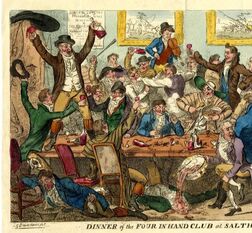 The Four in Hand club, a club for gentleman driving enthusiasts
The Four in Hand club, a club for gentleman driving enthusiasts Celia tells her sister frankly that she's repelled by the social set in London: "they are slaves, apes, discontented, envious beings, applauding with one breath, and censuring in the next; and the hypocrisy, Fanny—I blush to reflect on all I have heard.”
An elderly colonel drops by in one scene to pronounce: “When I meet the sons of men, whose names yet live in the memory of their country, when I see young and active men wasting their lives in pursuits, not only useless but degrading, I blush for my country—I anticipate an awful termination of that glorious constitution…”
A contemporary reviewer thought the novel did not exaggerate; the idle rich were setting a bad example for the lower orders. One reviewer said: “We are extremely sorry to say, that, as far as our knowledge of fashionable life goes, the picture is generally like. We say it with the more sorrow, because we know it to be very possible, that the vices and follies of one important class may bring down the very worst evils upon the whole community.”
The reviewers chose to overlook Celia's shortcomings as a novel, such as its lack of "discrimination of character," (ie everybody talks the same way), because of its “infinitely higher and more estimable qualities, those of Christian humility and Christian charity.”
(To an amazing extent, the reviewers of novels in Austen's age commented on the "moral tendency" of the novels they read, and very often the author added a preface explaining that their purpose in writing was to condemn vice and uphold virtue.)
Does Celia in Search of a Husband resemble Mansfield Park? Let's count the ways: the heroine is a prig, she lives with her aunt, one of the characters is named Fanny, another is named Mansfield, some frivolous people are fond of amateur theatricals, Celia is pressured to marry an eligible suitor she doesn't love, and it features a woman who leaves her husband and runs off with her lover. As well, there is one conversation which resembles Edmund Bertram and Mary Crawford's reactions to Maria's adultery:
(Fashionable Fanny wants to forgive Lady Ellincourt for her adultery.) “Sir Frederic will marry her directly,” said Lady Townly—"and she will be received in society, and we shall all forget what is past."
“Not all,” said the Baronet [Fanny's husband] with warmth, “nor shall she ever be admitted here, under any name.”
Celia blushed for her sister. There was a want of delicacy in her present defence…. If her understanding was not warped, her religion must be imperfect…”
In Mansfield Park, Austen acknowledges that social sanctions are worse for adulterous women than for their partners. In Celia, the morally stern Mr. Belford condemns both Lady Ellincourt and Sir Frederic: “the accomplished seducer who leads the married woman from the path of honour, is absolutely caressed, supported in his infamy, and his guilty partner received where she ought to be spurned…”
Although I think there is no hidden slavery message in this novel, there was one passing reference to “an Asiatic” fortune which “was made most rapidly." It seems to me that the nouveaux riche were sneered at just for being nouveaux riche rather than their exploitation of people of color living in distant climes.
| Celia's author is unknown Celia in Search of a Husband is not part of my new series of book reviews of novels that never got a review when they were published. It was well reviewed, chiefly for its morality, as apart from its literary merit, and went into three editions. Celia was authored by the anonymous "A Modern Antique," which I think is meant to convey that the author held staunchly to traditional views. The book is also credited to Medora Gordon Byron, which is almost certainly not his or her real name either. It's odd that a book promoting evangelical Christianity would be written by someone who later appropriated the family names of the scandalous poet Lord Byron. | "Lord Byron, get out of town." Language warning. |
The characters of another Minerva Press novel, Stratagems Defeated, speak admiringly of Celia Delacour and Celia in Search of a Husband. Celia herself, I suppose, would never read a novel.
I've got some more "judge-y" heroines coming up in future posts...
Previous post: Did Austen care about the poor? Next : My 100th Clutching My Pearls post!
| I mentioned that Coelebs in Search of a Wife inspired many knock-offs and sequels. In fact, scholars have argued that Mansfield Park and its heroine Fanny Price are heavily influenced by Hannah More's writings, with her emphasis on education that stressed morality and character, not showy accomplishments. Celia in Search of a Husband was reissued by Chawton Press Library in 2022. The foreword by Caroline Franklin gives more contextual background on the Coelebs publishing sensation and also explains that the original Coelebs novel was written in reaction to a French novel. |
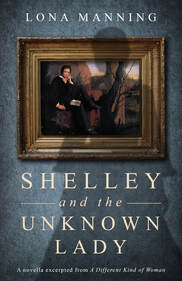 Lord Byron went to the continent, followed by Percy Bysshe Shelley. Shelley later told Byron that a beautiful, wealthy woman left her husband and followed him all over Italy. She caught up with him in Naples and died there. Was Shelley's story true? I used this mysterious story as the basis of my novella, Shelley and the Unknown Lady. For more about Shelley, click on the menu on the upper right. For more about my story, click here. |

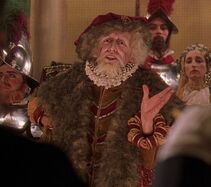
 RSS Feed
RSS Feed